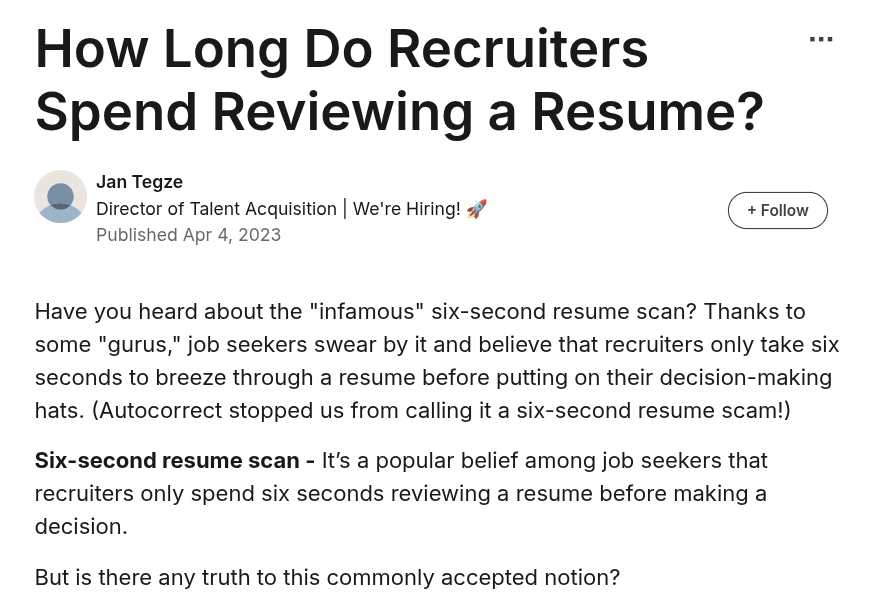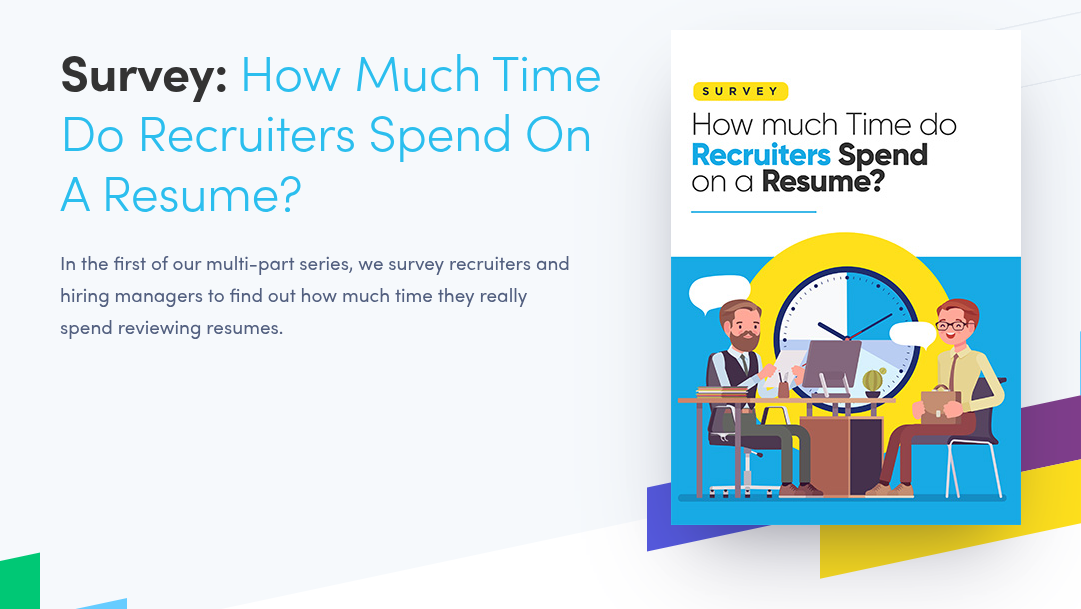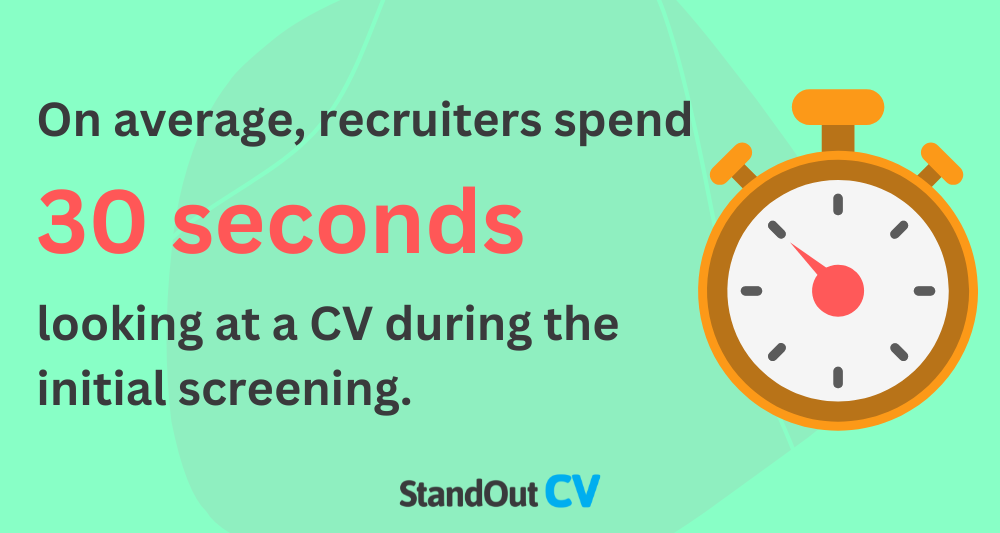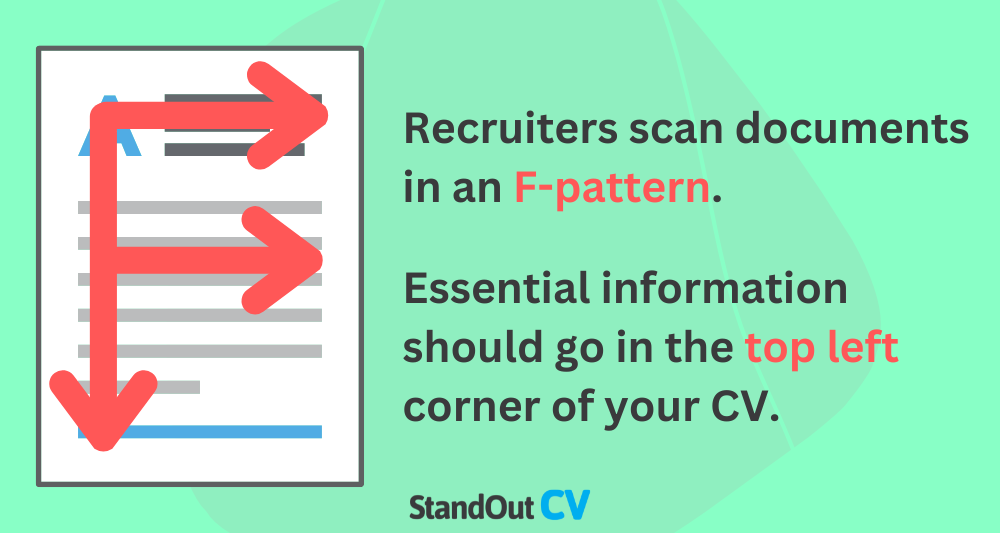You’ve spent hours perfecting your CV – but how long does a recruiter actually spend reading it?
On average, recruiters will read your CV for 30 seconds before deciding if you’re a good fit or not. That might not sound like much, but it’s more than enough to make an impact, provided your CV is well-structured and tailored to the job.
To get a clear answer, I’ve dug into the most recent studies and surveys on how long recruiters actually spend reading your CV. I’ve also gathered insights from real recruiters and hiring experts.
Key CV review statistics
- Studies show that recruiters spend an average of 30 seconds looking at a CV
- 80% of CVs do not get shortlisted by recruiters, meaning they do not make it past the first screen
- On average, only 11% of applicants are considered suitable for the roles they are applying to
- 99% of hiring managers use AI in the hiring process
- Around 49% of hiring managers will spend more time looking at a CV from a referred applicant
What studies have been done?
Jan Tegze’s independent study

In 2023, Jan Tegze, a bestselling author and Director of Technical Recruiting at software developer Tricentis, ran a study to test the validity of the long-standing claim that recruiters only spend six seconds reviewing a CV.
The study recorded how long 114 recruiters spent reviewing different CVs and capturing real, unbiased behaviour using tracking software.
What did they learn?
- The average time recruiters spent reviewing a CV was between 17 and 46 seconds, depending on the length and content of the CV.
- The shortest recorded view time was 12 seconds, which occurred for the briefest CV.
- The longest recorded view time was 2 minutes and 27 seconds, for the most detailed CV.
How did they carry out the study?
The study involved 114 experienced recruiters, each asked to review three different CVs. Before seeing the CV, participants were shown a job description for context – just as they would be in a real hiring scenario.
They were then presented with one CV at a time and asked to evaluate its suitability for the role. Only the time spent actively viewing the CV was recorded, using Microsoft Clarity.
Crucially, the recruiters were unaware they were being timed, allowing for more natural behaviour. With 114 participants, this makes for a useful sample of real hiring activity, rather than speculative or self-reported data.
Is it reliable?
While the study wasn’t peer-reviewed, its transparency and methodology make it one of the more trustworthy independent sources available. It avoids the marketing spin found in earlier “6-second scan” claims and includes a large, relevant sample size.
What makes this study feel trustworthy is that it wasn’t just based on guesses or surveys – Tegze actually tracked how long recruiters spent looking at each CV using proper analytics tools.
ResumeGo’s recruiter survey

In 2024, ResumeGo surveyed 418 U.S.-based hiring professionals – including both recruiters and hiring managers – to better understand how long they spend reviewing resumes and what influences their decision-making.
What did they learn?
- 81% of recruiters spend less than a minute on a CV during the initial screening
- 47% spend 30-seconds to 1-minute reviewing a CV.
- Only 1% spend less than 10 seconds reading it.
- Cover letters get even less attention: 66% of recruiters spend under 30 seconds reviewing them.
Other findings showed recruiters are willing to spend more time reviewing CVs depending on various factors:
- 73% said they’d spend more time reviewing a CV that’s longer than usual.
- 79% of recruiters would spend longer reading each CV if there were fewer applicants.
- 88% would spend more time reviewing a CV if they’re especially interested in the candidate.
Over 70% of recruiters said they “almost always” or “often” skim, and 78% rated skim-ability as highly important.
Despite this, formatting remains a major issue: 29% of recruiters say 41-60% of resumes they review are hard to skim, and 32% say 21-40% of CVs fall into that category, which shows there’s still plenty of room for improvement.
How did they carry out the study?
Unlike some other studies, ResumeGo clearly outlined their methodology: they used SurveyMonkey to collect responses from 418 hiring professionals between January and March 2024. All participants were screened to confirm recent hiring experience, and incomplete responses were removed.
While the study was based on self-reporting rather than observation, the participant pool is clearly defined and the survey design is openly explained.
Is it reliable?
As far as CV reading studies go, this one is relatively solid. It’s transparent about methodology, it includes a reasonably large sample size, and the questions are relevant to real-world recruiter behaviour.
That said, like all self-reported data, it depends on how accurately people estimate their own habits. But overall, the ResumeGo survey adds credible and up-to-date insight into how quickly recruiters scan CVs – and reinforces just how important clear formatting and a skimmable structure really are.
Older studies
Ladders eye-tracking study
In 2018, US job site Ladders released an eye-tracking study claiming that recruiters spend just 7.4 seconds reviewing a CV during the initial screening.
The research found that attention was drawn to job titles and subheadings, with clean, simple layouts performing best. However, the study lacks key details – like the number of participants, industries involved, or CV sample size – making it hard to judge how reliable the findings are.
While the headline number is often quoted, the lack of transparency makes it hard to view the study as solid evidence. It’s a widely cited stat, but one that should probably be taken with a pinch of salt.
Workopolis recruiter database study
Workopolis, a Canadian job board, analysed internal recruiter activity and found that nearly 60% of employers spent 11 seconds or less reviewing a CV. Just 14% spent over a minute, and almost 80% of CVs were rejected after the first glance.
While this data likely reflects real user activity and is more grounded than other studies, the company didn’t disclose how many recruiters or CVs were involved, making the findings difficult to fully verify. It’s a helpful snapshot, but the lack of detail means it should be interpreted with caution.
How long do recruiters spend reading your CV?
After reviewing the most recent and trustworthy studies, the evidence consistently suggests that recruiters spend 30 seconds reviewing a CV – at least during the initial screening.

- In Jan Tegze’s independent study, 114 recruiters were tracked as they reviewed real CVs. The average time spent ranged from 17 to 46 seconds, depending on the CV’s length and relevance.
- In ResumeGo’s 2024 recruiter survey, 47% of hiring professionals said they spend 30 seconds to 1 minute reviewing a CV. Only a small fraction – 1% – said they spend any less than 10 seconds.
- While older sources suggest shorter times, they lack transparency and don’t reflect modern hiring conditions, especially with the growing use of digital tools and applicant tracking systems.
So while there’s no universal number, 30 seconds is a fair and realistic estimate based on current research. It reflects the average time a recruiter spends making that crucial first impression.
Variables that affect CV review time
The truth is, there’s no universal rule for how long a recruiter will spend reviewing a CV: it can vary significantly depending on context.
Here are some of the key factors that influence how much attention your application gets.
Volume of job applications
When a role attracts hundreds of applicants, recruiters simply don’t have time to read every CV thoroughly.
In these high-volume scenarios, they’re forced to skim quickly and eliminate unsuitable candidates within seconds. Meanwhile, a smaller business, or one advertising a more specialist role, can afford to take more time on each applicant.
Size of the company
In smaller companies, hiring managers may personally read every CV – giving your application a little more individual attention.
But in larger organisations with structured hiring teams or external recruiters, your CV is likely to be one of many in a fast-moving process. The more layers involved, the more crucial it is that your key selling points stand out immediately.
Industry & profession
Different industries have different expectations. For example, academic or scientific roles often involve more detailed CVs with extensive qualifications and publications, which require closer reading.
In contrast, high-turnover roles in retail or hospitality may be assessed much faster, with recruiters simply scanning for availability and key soft skills.
Deadlines
Recruiters are almost always working to some kind of deadline – but the urgency of those deadlines can drastically impact how long they spend on each CV..
For instance, an internal recruiter with sole responsibility for a role and several months to fill it has the luxury of reviewing applications in more detail. They’re more likely to take their time and consider a wider range of candidates.
In contrast, an agency recruiter racing against several competing firms to deliver the right hire first is likely to skim CVs at speed.
How the CV reaches the recruiter
The way your CV lands in a recruiter’s inbox can have a surprising impact on how much attention it gets. Not all CVs are viewed equally: how it reaches them often shapes how closely it’ll be read.
- Job applications – When a recruiter advertises a role, they often receive a flood of applications – many of which aren’t a good match, or might’ve even been sent autonomously. Because of this, they tend to scan these CVs quickly, hoping something promising jumps out.
- CV database searches – Recruiters often search job boards or internal systems using specific keywords tied to the role. Since these searches usually return more targeted results, CVs found this way are often more relevant and therefore get more focused attention.
- Referrals or recommendations – A CV handed over by a trusted colleague or contact comes with higher expectations. Because the recruiter already has reason to believe it’s worth reviewing, referred CVs get the most time and scrutiny. LinkedIn research found that 49% of hiring managers look more closely at a referral’s application.
Stage of the hiring process
Early in the hiring process, recruiters are screening for general fit – so writing your CV needs to convey relevance at a glance. Later on, such as before an interview, your CV may be re-read in more detail as the hiring team prepares to ask specific questions.
What do recruiters say?
How do recruiters read your CV?
In order to maximise the length of time recruiters spend reading your CV, it’s important to understand where their attention is focused most. Luckily, there are a couple studies into the psychology of how people – especially recruiters – read documents like CVs.
Reading patterns
When recruiters open a CV, they don’t read it like a novel – they scan it. And one of the most well-documented scanning behaviours is the F-pattern, a concept backed by eye-tracking research from the Nielsen Norman Group and other usability studies.
The F-pattern describes how readers tend to look across the top of a page, then slightly lower across again, and finally scan down the left-hand side – forming a rough “F” shape with their eyes. This pattern is especially common when people are trying to process any kind of information quickly, like when reviewing numerous CVs.

This is why it’s crucial to put the most important information – like job titles, key skills, and achievements – near the top and left of your CV.
Formatting your CV with this natural reading behaviour in mind makes it more likely that recruiters will notice the key details you want to highlight in the short span of time they spend looking at it.
Pina et al. machine learning study
A 2023 academic, scientific study by Pina et al. used eye-tracking and AI to analyse how 221 real recruiters reviewed over 2,000 CVs. The scholarly paper captured where recruiters looked, for how long, and what led to a CV being approved.
The study makes one thing very clear: recruiters focus most on the Experience and Education sections. That’s where they spend the majority of their time, and it’s those areas that tend to drive approval decisions.
There was no time limit, and many CVs were reviewed for over a minute – some for several. Using only the eye-tracking data, researchers could accurately predict which CVs would be approved, showing that holding a recruiter’s attention really does boost your chances.
Impact of AI on CV review
The days of every CV being read manually are long gone. In fact, 99% of hiring managers now use AI in some part of the recruitment process, according to Insight Global’s 2025 AI in Hiring Report, while 70% say it’s improved their hiring decisions.
Making use of AI reduces the average cost of hiring a candidate by 71%, and saves recruiters about 4.5 hours per week.
For most roles – especially in medium to large organisations – your CV is likely to be screened by an Applicant Tracking System (ATS) before a recruiter ever sees it. These systems quickly scan for relevant qualifications, experience, and – crucially – keywords lifted directly from the job description. If your CV lacks those keywords, it may be filtered out automatically.
That means your CV may not even reach a recruiter unless it passes initial automated filters. Therefore, a human may spend no time at all reviewing your CV – it could be discarded by an algorithm before anyone even sees it. This means your CV now has two audiences to impress: the machine and the recruiter.
We’ve got a full report on the impact of AI on recruitment, with all the latest stats and data.
How to get recruiters to spend more time reading your CV
As you know, it’s vital to make your CV too good to skim past in a few seconds. Combining the research covered above, and the consensus of recruitment industry experts, the following tips make for good ways of ensuring recruiters read your application more thoroughly.
- Tailor your CV to each job – Generic applications are easy to spot. Align your CV with the job description by mirroring the language used and focusing on the skills and experience the employer values most.
- Learn new skills – Upskilling shows initiative and makes your CV stand out. Even short online courses or certifications can boost your credibility and show you’re serious about the field.
- Put the important stuff at the top – Make sure your most impressive qualifications, experience, and skills are placed near the top of the page. You want to grab attention within the first few seconds.
- Include measurable achievements – Don’t just list duties, demonstrate impact. Use numbers, percentages, or outcomes to show what you’ve accomplished (e.g. “Increased web traffic by 40%”).
- Use bullet points – Dense paragraphs slow recruiters down. Bullet points break your CV into digestible chunks and make it easier to scan quickly.
- Format your CV effectively – Use clear section headings, consistent spacing, and professional fonts. Good formatting makes your CV more readable and ensures key details aren’t missed.


